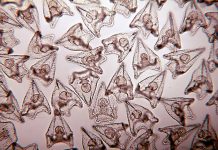In 1973, three biologists shared the Nobel Prize for medicine: two Austrians who had conducted most of their research in Germany, Karl von Frisch and Konrad Lorenz, and the Dutchman Nikolaas Tinbergen
All of them were recognized for their achievements in behavioural biology and carried out fundamental research during the era of National Socialism. But as the following explanations show, their attitudes and fates were very different. (The fate of Tinbergen is not discussed here.)
Biologists in Nazi Germany: Karl von Frisch and the campaign aimed at his dismissal
von Frisch became known through his work on the sensory physiology of insects and vertebrates. He shared the 1973 Nobel Prize for his deciphering of the ‘language of bees’, that is, communication by dances on the honeycomb, research that he began in 1912. In 1925, he became a professor at the University of Munich. Experiments between 1944 and 1946 led Frisch to the until-today accepted view of the meaning of the dances.
The Law for the Restoration of the Civil Service of 7 April 1933 put Frisch’s position in jeopardy. The law was aimed at ‘purging’ the entire civil service, which included the universities, from Jews and people with Jewish ancestors. University teachers with at least one Jewish grandparent were dismissed, independently of their religious beliefs or achievements.
In 1933, Frisch remained in his position as a ‘one-eighth Jew’. However, politically active groups of students and lecturers wanted to have Frisch replaced with a committed National Socialist. They accused him of being a friend of Jews, of employing preferentially ‘reactionary Germans’ (i.e., not National Socialists), even foreigners, of having a large number of women among his students, and of conducting ‘Jewish’ science that did not relate to a volkish polity, ‘something that seems so self-evident and would be so easy given his areas of expertise, bees.’
Interestingly, these accusations did not seriously threaten Frisch’s position. However, the leaders of the campaign submitted written testimonies to the Ministry, according to which he appeared to be a ‘one-quarter Jew’ instead of a ‘one-eighth Jew’. Therefore, in January of 1941, the rector informed Frisch about the intention of the Minister of Culture to dismiss him according to the civil service law.
Petitions from prominent colleagues were to no avail. However, a politically influential person eventually convinced the Minister that Frisch’s work was important for food policy, and the Ministry postponed his dismissal until after the war. In 1945, Frisch became a professor in Graz but later returned to his position in Munich.
Konrad Lorenz and the National Socialist Race Doctrine
Konrad Lorenz was the co-founder (with Nikolaas Tinbergen and Erich von Holst) of ethology (comparative animal behaviour), an achievement for which he shared the 1973 Nobel Prize. Ethology differed fundamentally from the behaviourism of Watson and Skinner that focused on conditioned reflexes and learning, by its emphasis on instinctive behaviour determined largely genetically.
The concept of ‘instinct’ became clearly defined and elaborated, replacing the speculative, vague notion of instinct. Behaviour has now become a topic of biological research, connected to questions of evolution.
Lorenz conducted a large part of the research that led to the foundation of ethology in biology during the Thirties and early Forties in Austria and Germany. In 1940, he was appointed Professor of Psychology in Germany. He joined the Nazi party in 1938, shortly after it was legally possible in Austria as a result of the Anschluss – party membership never became an official prerequisite for promotions though it was beneficial – and he became a member of the party’s Office of Race Policy.
His scientific work thereafter was fully entrenched with Nazi ideology; Lorenz demanded a scientifically underpinned racial policy, the eradication of ‘defective elements’ from society, the elimination of ‘ethically inferior types’, and so on, during the years 1940 to 1943. He did not specify what concrete measures he was thinking of when propagating elimination or eradication.
But it should be noted that from 1933 on, Nazi policy incorporated the concept of elimination into its population policy, through: the law of prevention of genetically diseased offspring (by forced sterilization) in 1933; the Nuremberg Laws in 1935, one of which aimed at furthering racial purity; the practice of euthanasia in 1939; and the ‘final solution of the Jewish question’, the Holocaust, that was launched in 1941.
In an interview in 1981, broadcast in Austria and Germany, Lorenz maintained: ‘That they meant murder when they said elimination or selection was something I really did not believe at the time. This is how naive, how stupid, how gullible – call it what you will – I was back then.’
But Lorenz’s activities during the war cast doubt on this statement. In 1942, he participated as a psychologist in studies in Posen (today Poznan) that contributed to the scientific underpinning of Nazi population policy in Poland. This policy included, for example, the selection of potential Polish slave workers and the elimination of Polish intellectuals and Jews.
The studies were conducted in the frame of an SS foundation that was headed by high-ranking SS-leader Arthur Greiser, who was responsible for the mass deportation of Poles and Jews to concentration camps and who was hanged in 1946. In 1943, Lorenz was drafted to the Eastern front and afterwards became a Russian prisoner of war. In 1948, he returned to Austria, and in the 1950s, he became a director of two Max Planck Institutes in Germany.
Biologists in Nazi Germany – a look at the post-war period; general assessment
In a book about the Nazification of folklore in the Third Reich, Dan Ben-Amos quoted from the Mishna (a collection of Jewish oral traditions): ‘Judge not your fellow man until you have reached his place (situation).’ He thinks that this dictum is generally wise, but that in this case, we have to make judgement: ‘The Nazi collaborators eroded the scholarly and moral foundation of the discipline of folklore.’
In my opinion, this also applies to Lorenz’s behavioural science from 1940 to 1943, despite his earlier achievements. Even after the war, neither Lorenz nor ethologists in Germany and Austria publicly addressed his political past; Lorenz remained ethologists’ leading scientist for decades. From an ethical perspective, he is an example of the misuse of science for ideological and potentially murderous ends.
The cases of von Frisch and Lorenz exemplify important characteristics of science and biologists in Nazi Germany: The Nazi terror at the universities was at its core a racist terror, directed against Jewish academics; students and young academics played an important role in its implementation. Non-Jewish scientists enjoyed substantial freedom of research and financial support; some of them were or became internationally renowned. Nazi racial doctrine was advanced not only by scientific cranks but also by some excellent scientists. As we see in many other cases to this day, scientific excellence does not preclude moral failure.
The article is based on Ute Deichmann, Biologists under Hitler, Harvard University Press 1996.
Contributor Details
More About Stakeholder
-
The Jacques Loeb Centre for History and Philosophy of, and Critical Dialogues in, the Life Sciences
Research into the history and philosophy of modern experimental life sciences and the societal implications.
Editor's Recommended Articles
-
Must Read >> Irreproducibility and scientific truth











